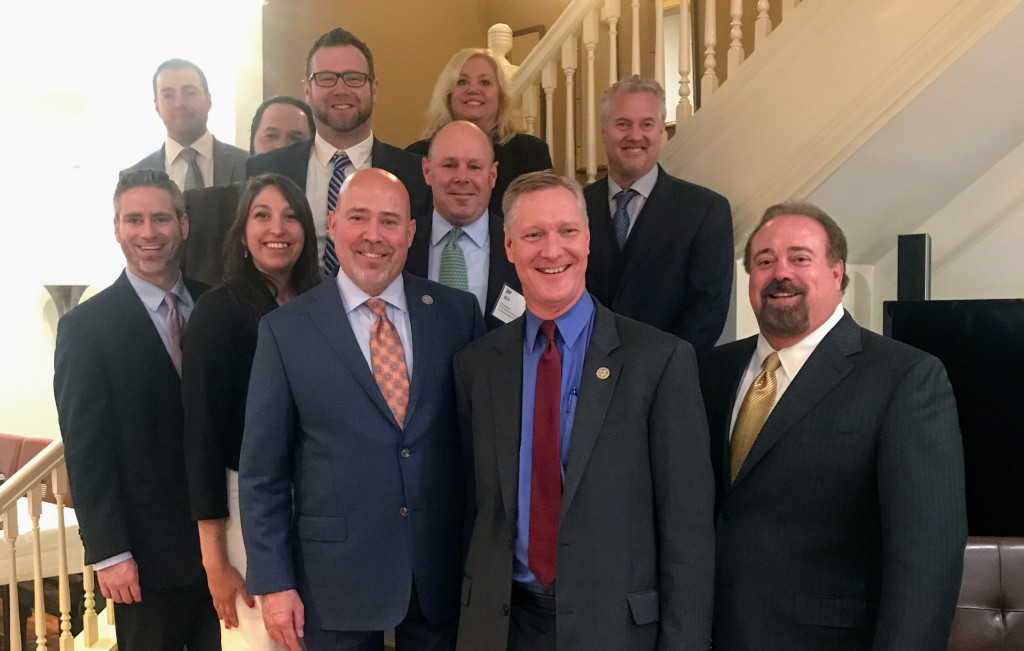Archive for 2017
Sneak Peek of Our May/June 2017 Magazine Issue
June 5, 2017
Move over New York, California and Florida because Texas has become a strong incubator for alternative small business finance. In this newest deBanked magazine issue, we went to Dallas-Fort Worth, Austin and Corpus Christi to find out how and why non-bank financing products are flourishing. We were impressed by what we found and inspired just enough to dub Texas The ‘Loan‘ Star State.
And we went bigger than Texas (if that can be believed) by exploring how alternative lenders are spreading their wings beyond the states into other countries like the UK, Australia and Canada. But does it make sense to go abroad before you’ve cornered the market domestically? Industry captains share their thoughts.
There’s more of course, like how new tweaks to automated processes are actually making manual underwriting exercises easier. That itself has re-opened a debate that won’t seem to go away, humans vs computers in underwriting. In 2017, the humans aren’t out of the game yet and some think they never will be, but there are new tools available to increase speed and efficiency.
There’s legal decisions you’ll want to read and details about a new small business lending regulator you’ll want to know about. It’s all in the May/June 2017 issue that subscribers will be receiving in the mail soon and if you’re not subscribed, you should sign up FREE right now!
CloudMyBiz and Ocrolus Announce Ground-Breaking FinTech Partnership
June 4, 2017

June 4, 2017 – CloudMyBiz, a leader in Salesforce development and implementation, is pleased to announce a new partnership with Ocrolus, an emerging innovator in bank statement review automation. The integration of the PerfectAudit API, powered by Ocrolus, into the Fundingo lending platform by CloudMyBiz, has created the industry’s first turnkey solution, revolutionizing Alternative Lending.
“For years, lenders have relied on inefficient and lengthy procedures for bank statement review, a critical part of the loan underwriting process. This is no longer the case. Combining the PerfectAudit API with our Fundingo Underwriting automation, we are taking the slowest part of the lending process and supercharging it. This partnership will have a huge impact on FinTech.” said Henry Abenaim, Founder and CEO of CloudMyBiz.
The PerfectAudit API analyzes uploaded bank statements with 99+% accuracy, replacing manual review with automation. Ocrolus technology enables lenders to review every borrower’s bank statement data automatically, regardless of whether or not the borrower provides sensitive bank login credentials. Through the partnership with CloudMyBiz, the PerfectAudit API will be integrated directly into Salesforce.
“Until we started plugging in the PerfectAudit API, even the elite, technology-driven lenders could not review every application digitally,” said Sam Bobley, Co-founder and CEO of Ocrolus. “Partnering with CloudMyBiz is a groundbreaking moment because it’s leveled the playing field, allowing lenders of all shapes and sizes to transition to a hyper-accurate loan determination process within days. CloudMyBiz takes on all the implementation work, so achieving greater accuracy and automation than firms who’ve invested millions into technology is now just a phone call away.”
About CloudMyBiz
The CloudMyBiz team, via the Fundingo suite of apps, empowers business through the Cloud and encourages streamlined collaboration between departments, clients, customers and partners. CloudMyBiz focuses on Salesforce Implementation, Migration, Integration and Development, Third Party Applications, and Custom App Development, all specializing for the lending industry.
About Ocrolus
Ocrolus is a technology company that automates the review of bank statements. The Company’s PerfectAudit platform analyzes statements from every financial institution with 99+% accuracy, generating account information, summary analytics and a comprehensive database of transactions. By replacing one of the few remaining manual underwriting procedures with hyper-accurate automation, Ocrolus strives to strengthen the FinTech ecosystem.
Contact Information:
Dennis Mikhailov
Business Development | CloudMyBiz, Inc.
P 818.732.4316 | M 818.419.7339
dennis@cloudmybiz.com
Sam Bobley
CEO, Ocrolus Inc.
o: 646.850.9090 Ext. 1
c: 516.233.4293
sbobley@ocrolus.com
Are Small Business Borrowers Bank-Loyal to a Fault?
June 1, 2017 Applying for a small business loan is easier than it’s ever been. Online lenders have streamlined the process, brought it all online and whittled down approval times. Still, the majority of small business owners still think a bank is the only place to get a loan. They’re four times more likely to seek funding from banks than any other source; more than 80 percent of funding applications go to traditional financial institutions.
Applying for a small business loan is easier than it’s ever been. Online lenders have streamlined the process, brought it all online and whittled down approval times. Still, the majority of small business owners still think a bank is the only place to get a loan. They’re four times more likely to seek funding from banks than any other source; more than 80 percent of funding applications go to traditional financial institutions.
Big banks’ small business loan approval rates have dropped sharply thanks to tightened regulations and compliance costs post-Great Recession. Because the transaction costs on a $100,000 loan are roughly the same as a $1,000,000 loan, banks are passing right over small business owners seeking smaller amounts. And since the majority of small businesses want loans smaller than $100,000, they’re not being served by the institutions they turn to first.
Small Business Borrowers Turn to Banks First, But They’re Not as Loyal as They Seem
While it would seem that small business borrowers are loyal to a fault, a Lendio survey of 50,000 business owners found that 74 percent of them would move their account to a new bank if the new bank offered them a loan.
Business owners may be keeping their deposits at banks and turning there first when they set out to obtain funding, but when push comes to shove, they want the easiest path to accessing the capital that will keep their businesses afloat or help them to grow and scale.
Banks Realize They Can’t Rely on Customer Loyalty Alone
Banks have shifted some of their focus back to the small business loan market in the last couple of years. In this space where online lenders have made the process of applying for a loan much more customer-friendly, banks have realized that in order to remain competitive, become more effective and profitable, and ultimately retain customers, they must take a page from the book of online lending.
As little as two years ago, banks were closed off to the idea of outsourcing in the online lending space, while lending firms were armed with technology and ready to compete. Banks have caught on to the idea that investing in a fintech partnership is a quicker, less-expensive way to build technology and create a better customer experience without completely reinventing the wheel, allowing them to serve more of the small business borrowers they’ve been turning away. Now both parties are seeing the value in joining forces.
Recent partnerships in areas such as merchant services, researching, underwriting and accounting software have paved the way for more collaboration between banks and online lenders. Last year we saw banks begin to explore new strategies for converging with online lenders through licensing deals and partnerships, and this year we’ll see even more collaboration in the marketplace.
Partnerships, like JPMorgan Chase’s team-up with online lenders OnDeck and LiftFund, allow banks to leverage technology while expanding their loan offerings and revenue. ScotiaBank, Santander and ING have collaborated with online lender Kabbage to license its technology platform for automating a more efficient underwriting process and to provide more comprehensive lending solutions.
Bank-Alternative Lending Partnerships Are a Win-Win-Win
For banks, the benefits of an alternative lending partnership lie not only in cost savings and tech advances, but also in building and maintaining those loyal customer relationships that have served them for decades. Banks will be able to capture a new generation of customers while also retaining more of their existing customers’ deposits by providing them a better, more streamlined loan application and approval process.
And in such partnerships, online lenders and marketplaces win big too, with access to some of the built-in advantages of a bank: an existing customer base with a high level of trust, risk management experience, access to key data and the ability to offer low-cost capital.
Bank-fintech partnerships offer both parties the opportunity to improve processes and reduce costs. And more importantly, they offer those bank-loyal small business borrowers more options, more efficiently when they turn to the banking institutions they know. When banks and online lenders collaborate to serve small business owners, it’s a win-win-win.
Commercial Finance Coalition Continues to Engage
June 1, 2017
A sign of a mature industry? The Commercial Finance Coalition is becoming a major liaison between the merchant cash advance industry and Washington. Just as peer-to-peer lenders and electronic payment companies have their own trade associations, the CFC is regularly engaging with legislators to offer their input where needed. And that requires a concerted effort, as evidenced by the group’s most recent trip that included meetings with 26 Members of Congress and senior staff. Those are typically separate individual meetings so you can imagine the amount of time and preparation involved.
“The Commercial Finance Coalition (CFC) conducted our third Washington, DC legislative fly-in last week,” Dan Gans, the CFC’s executive director, said to deBanked. “Fifteen members of the organization attended as well as a few prospective members. The CFC continues to establish itself as the premier trade group in the MCA and alternative small business finance space.”
The CFC also gets involved at the state level and played a role in preventing harmful legislation in New York a few months back. Most importantly, their mission is to simply tell their story.

“Studies show that traditional banks cannot meet the overwhelming demand for small business capital in the United States and we be believe that CFC members help thousands of entrepreneurs grow and sustain their businesses,” Gans explained. “We believe it is critical to educate policy makers in Washington and in state capitals like Albany and Sacramento about the vital role our industry plays in helping small businesses achieve success.”
The CFC is not the only trade association in the industry, but they have made political engagement a focal point of their mission since they were founded 18 months ago.
Gans elaborated on this. “Since its establishment in January of 2016, the CFC has been educating Members of Congress and state legislators about MCA and non-bank small business finance. We give our members a needed voice with elected officials and regulators. I would encourage anyone in the MCA space that is not a CFC member to inquire about membership. The industry is facing many threats and it is important that groups like the CFC stand in the gap to educate government leaders about the thousands of jobs advances from our members create across the country.”
To inquire about CFC membership, they advise to please contact Mary Donohue at mdonohue@polariswdc.com or call (202) 368-9758.
Full disclosure: I have accompanied the CFC on their DC fly-ins and the engagement is every bit as real and consequential as it sounds.
IOU Financial Reports Q1 Results, Lost $1M
May 31, 2017IOU Financial lent (CAD) $22.1 million in the first quarter of this year, down from $25.4 million over the same period last year. This translated into a $995,085 loss on $4.3 million in revenue.
Their quarterly report said that they will continue to focus on achieving profitability in 2017, much like another company in the space. IOU had a net loss of $4.8 million last year.
IOU had previously disclosed that they were in breach with a third party lender, MidCap Financial, over the consolidated tangible net worth covenant of their agreement. IOU has a $50 million credit facility with MidCap, who granted them a waiver on that breach last month in April. Their latest earnings report, however, states that IOU had now also breached the fixed charge coverage ratio covenant, and that MidCap has just granted them another waiver.
MidCap Financial also just recently approved a credit facility for Fundation, an IOU competitor.
Why OnDeck is Underperforming its Peers
May 29, 2017![]() Small business lending company OnDeck was down nearly 23% on the year when the market closed on Friday. One of their closest rivals, Square, a company that makes business loans in addition to offering payment processing services, was up almost 64% this year so far. The disparity can be partially attributed to the market’s changing perception of OnDeck, originally viewed as a disruptive technology company, to what they’re seen as now, a niche commercial lender. Their tech multiple is gone, putting their market capitalization near book value.
Small business lending company OnDeck was down nearly 23% on the year when the market closed on Friday. One of their closest rivals, Square, a company that makes business loans in addition to offering payment processing services, was up almost 64% this year so far. The disparity can be partially attributed to the market’s changing perception of OnDeck, originally viewed as a disruptive technology company, to what they’re seen as now, a niche commercial lender. Their tech multiple is gone, putting their market capitalization near book value.
Square is faring differently since they have virtually no borrower acquisition costs (whereas OnDeck has high acquisition costs) and a strong revenue stream outside of loans. Square’s strategy is to turn its existing payment processing customers into borrowers.
Meanwhile, Lending Club, an online lender that makes both consumer loans and business loans, is up 6.48% on the year. Despite being down 63% from their IPO price, Lending Club is different in that they generate fee income off of originated loans rather than book loans on balance sheet like OnDeck.
What ties them all together is that OnDeck, Square and Lending Club all rely on chartered banks to make the loans they advertise, a model that is coming under scrutiny by states such as New York. OnDeck and Square both depend on Celtic Bank, a Utah-chartered industrial bank.
Among its peers, OnDeck arguably has the riskiest makeup. They’re concentrated in only one type of lending, they have high acquisition costs, and they retain direct exposure to the loans they generate. Combine that with a lack of profits, lack of growth, and future regulatory challenges ahead, and it’s easy to understand why they’re so significantly underperforming the pack.
The CFPB’s Small Business Lending RFI Has Already Received Responses
May 28, 2017Three responses to the CFPB’s Request For Information on small business lending have already been submitted and here’s what they say.
Kent Franzen, a career banker, said that the law limiting an underwriter’s access to an applicant’s minority-owned or women-owned business status is “literally impossible.”
“Considering that in every small bank I have worked in or am otherwise familiar with the loan officer is the primary borrower contact, the loan data collector, the primary underwriter, the author of the loan documents, the notary public for collateral documents and the loan servicing agent. This requirement is literally impossible to comply with in a community bank.“
Franzen again in regards to what concerns does he have about the possibility of misinterpretations being drawn by regulators from the collection of data pursuant to Section 1071:
“[…]I am very concerned that the so called disparate impact analysis will be used as a persecution instrument against smaller institutions that present a political expedient target of opportunity. I point out the total absence of new bank charters since Dodd Frank was enacted as proof that the country has already amassed an amount of bank regulation that is slowly choking community banks. The only institutions that thrive under this crushing regulation load are those already too big to fail.”
Jayne Lovig, a loan officer, said this:
“Your request for business lending data collection is duplicating what we are already compliling and submitting to: USDA, SBA, CDFI (Community Development Financial Institutions), OFN (Opportunity Finance Network), and the Microenterprise Census Tracker. Your data collection will compound existing regulatory reporting burdens, and again, DUPLICATES WHAT WE ARE ALREADY PROVIDING TO FEDERAL LENDING AGENCIES. Why explore size standard approaches that are ALREADY defined with EXISTING agency reporting? By coming up with new definitions you will be adding unnecessary confusion. I suggest that since ALL the data you are requesting is ALREADY BEING REPORTED that you interface with the USDA and SBA (who have already “invented the wheel”) and compile the data from them electronically.”
And lastly, 13 trade associations penned a joint letter asking the CFPB to extend the RFI deadline from July 14th to September 12th to allow them adequate time to fully formulate their answers. Those associations are:
American Bankers Association
American Financial Services Association
Consumer Bankers Association
Credit Union National Association
Electronic Transactions Association
Equipment Leasing and Finance Association
Financial Services Roundtable
Independent Community Bankers of America
National Association of Federally-Insured Credit Unions
National Federation of Independent Business
Small Business & Entrepreneurship Council
Truck Renting and Leasing Association
U.S. Chamber of Commerce
Learn more about the purpose of this RFI (which is voluntary) here.
SEC Reported To Be Looking Into CAN Capital and Prosper
May 27, 2017Bloomberg reporter Matt Scully reiterated on Friday that the SEC is looking into CAN Capital “after that firm failed to report to bondholders that some customers’ loans were in default.” That was referencing a previous December inquiry reported back in February. CAN’s $200 Million securitization suffered a rapid amortization event in the second half of 2016, compounding other problems including a reported breach with their Wells Fargo credit facility. The company never quite recovered despite CAN’s Acting CEO, Parris Sanz, telling the WSJ back in January that the problems were akin to changing a flat tire. The previous CEO along with the company’s chief risk officer, chief financial officer, and chief marketing officer have all left.
Bloomberg also reported that online consumer lender Prosper is being probed by the SEC after they disclosed that they had overstated investor returns. The inquiry was said to only be in a preliminary stage.
Update: The inquiry with CAN originated in December but it was not widely reported. The above has been edited to reflect the timing.





























